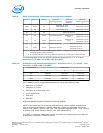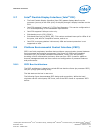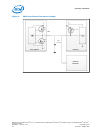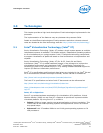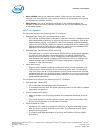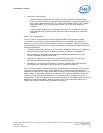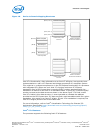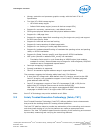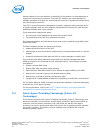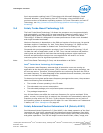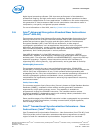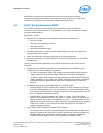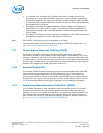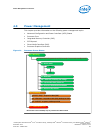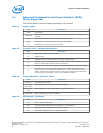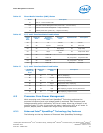
Another aspect of the trust decision is the ability of the platform to resist attempts to
change the controlling environment. The Intel TXT platform will resist attempts by
software processes to change the controlling environment or bypass the bounds set by
the controlling environment.
Intel TXT is a set of extensions designed to provide a measured and controlled launch
of system software that will then establish a protected environment for itself and any
additional software that it may execute.
These extensions enhance two areas:
• The launching of the Measured Launched Environment (MLE).
• The protection of the MLE from potential corruption.
The enhanced platform provides these launch and control interfaces using Safer Mode
Extensions (SMX).
The SMX interface includes the following functions:
• Measured/Verified launch of the MLE.
• Mechanisms to ensure the above measurement is protected and stored in a secure
location.
• Protection mechanisms that allow the MLE to control attempts to modify itself.
The processor also offers additional enhancements to System Management Mode
(SMM) architecture for enhanced security and performance. The processor provides
new MSRs to:
• Enable a second SMM range
• Enable SMM code execution range checking
• Select whether SMM Save State is to be written to legacy SMRAM or to MSRs
• Determine if a thread is going to be delayed entering SMM
• Determine if a thread is blocked from entering SMM
• Targeted SMI, enable/disable threads from responding to SMIs both VLWs and IPI
For the above features, BIOS must test the associated capability bit before attempting
to access any of the above registers.
For more information, refer to the Intel
®
Trusted Execution Technology Measured
Launched Environment Programming Guide.
Intel
®
Hyper-Threading Technology (Intel
®
HT
Technology)
The processor supports Intel Hyper-Threading Technology (Intel HT Technology) that
allows an execution core to function as two logical processors. While some execution
resources, such as caches, execution units, and buses are shared, each logical
processor has its own architectural state with its own set of general-purpose registers
and control registers. This feature must be enabled using the BIOS and requires
operating system support.
3.3
Processor—Technologies
Desktop 4th Generation Intel
®
Core
™
Processor Family, Desktop Intel
®
Pentium
®
Processor Family, and Desktop Intel
®
Celeron
®
Processor Family
Datasheet – Volume 1 of 2 December 2013
44 Order No.: 328897-004



